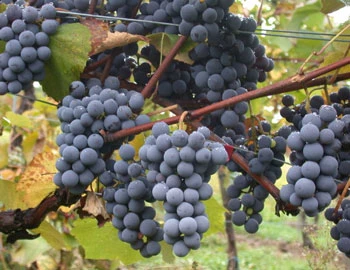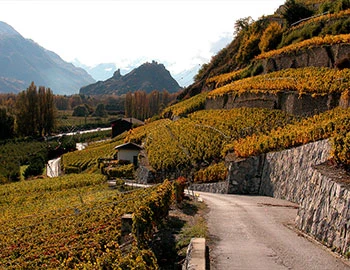Clos des Corbassières Gamay Vieilles Vignes 2022
AOC Valais, Domaine Cornulus, 750 ml

| Grape variety: | Gamay |
| Producer: | Domaine Cornulus |
| Origin: | Switzerland / Wallis |
Description
The old Gamay vines (35 - 80 years old) grow on steep, sunny terraces within the historic Clos des Corbassières. The first Gamay vines were planted at the beginning of the last century. This Gamay exudes a generous scent of raspberries, rose petals, red cooked plums, vanilla and sweet tobacco. It unfolds on the palate velvety, juicy and fresh. It has a drinkable effect and is a great drinking pleasure when slightly chilled. The aromas are reminiscent of blueberry jam, morello cherries and some graphite. The finish is long and full-bodied. A culinary passe-partout that pleasantly surprises connoisseurs. Serve as an alternative to white wine.
Attributes
| Origin: | Switzerland / Wallis |
| Grape variety: | Gamay |
| Label: | Certified organic or biodynamic wine |
| Ripening potential: | 2 to 7 years |
| Drinking temperature: | 14 to 18 °C |
| Food Pairing: | Cold fish dish, dried meat, Wild fowl, Succulent chicken breast with cream sauc, Fish terrine, Fondue and raclette |
| Harvest: | hand-picking with simultaneous grape sel |
| Maturation: | in large wooden barrel/foudre |
| Volume: | 13.5 % |
| Note: | Contains sulphites |
Domaine Cornulus
What started out from humble beginnings over 20 years ago is now one of Valais’ flagship wineries and the byword for both a way of working in harmony with nature and premium wines, all of which strongly bring out their individual terroir.
Valais natives and cousins Stéphane Reynard and Dany Varone are perfectionists who love what they do. They tend to their vines, which live and thrive above Sion in the village of Savièse, as if they were their own children. Thanks to Dany Varone’s meticulous and expert work in the wine cellar, they craft terroir wines of the highest quality. This winemaking duo – now part of the Valais elite – laid the foundation for their successful Domaine Cornulus project in 1986, setting up the “Buteo” wine cellar and launching their “Garage Winery”. They bought their first harvests straight off the vines of various Savièse winegrowers and started pressing them in a garage. The following year, they leased their first vines in the vineyards above Sion (less than 1 hectare). In 1989 they created the Sélection Cornulus, after which their winery is named. A few harvests later, they acquired their first plots in the Clos de Mangold in 1995. Their dream of establishing a real domaine of their own gradually took shape. “After all, you will rarely find a good wine without terroir,” say Stéphane and Dany. In 1999 there followed the “prime cut”, the famous Clos des Corbassières, the jewel in the domaine’s crown. In the course of the “noughties”, they successively acquired various Grand Cru plots between Sion and Sierre as well as Clos Chamaray, St-Charles and La Follie. The rich palette of exquisite vines was finally rounded off to perfection by the magnificent Clos des Monzuettes.

Gamay
The ideal summer red
The first written mention of the Gamay grape was not particularly flattering. In 1395, Philip the Bold, Duke of Burgundy, wrote that the variety showed a “terrible bitterness” and was “very harmful to human beings”. For this reason, the entire stock was to be pulled within five months. Luckily, it did not come to this. Otherwise, today we would have neither the excellent crus of Beaujolais, produced from this grape, nor the Dole du Valais a marriage of Gamay and Pinot noir. Admittedly, the Beaujolais nouveau, which was clamoured about in the 1980s, is not its best manifestation. But with good maturity and competent grapes, the Gamay shows great charm and a fragrant strawberry, raspberry and cherry fruit, backed by peppery notes. It is the ideal summer red: slightly chilled, it tastes great on the terrace, and is excellent with grilled fish.

Switzerland
Switzerland – A small country with enormous diversity
Switzerland is famous for its banks, watches, and cheese, but not necessarily for its wine. The Swiss didn't invent wine, but they have been extremely open and curious to it. Wine culture arrived in what is now modern Switzerland via several routes: from Marseilles to Lake Geneva and the Lower Valais region; from the Aosta Valley through the Great St. Bernard Pass to the rest of Valais; from the Rhone through Burgundy, across the Jura Mountains to Lake Constance; and from Lombardy to Ticino, and then on to Grisons.



